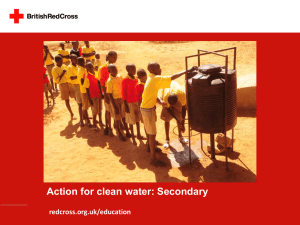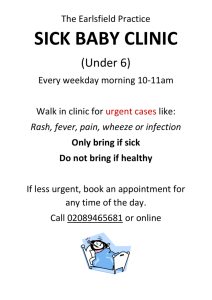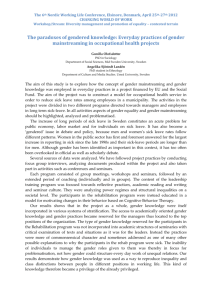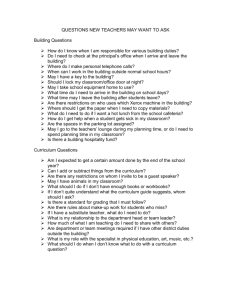Care Seeking for Sick Child BA Questionnaire
advertisement
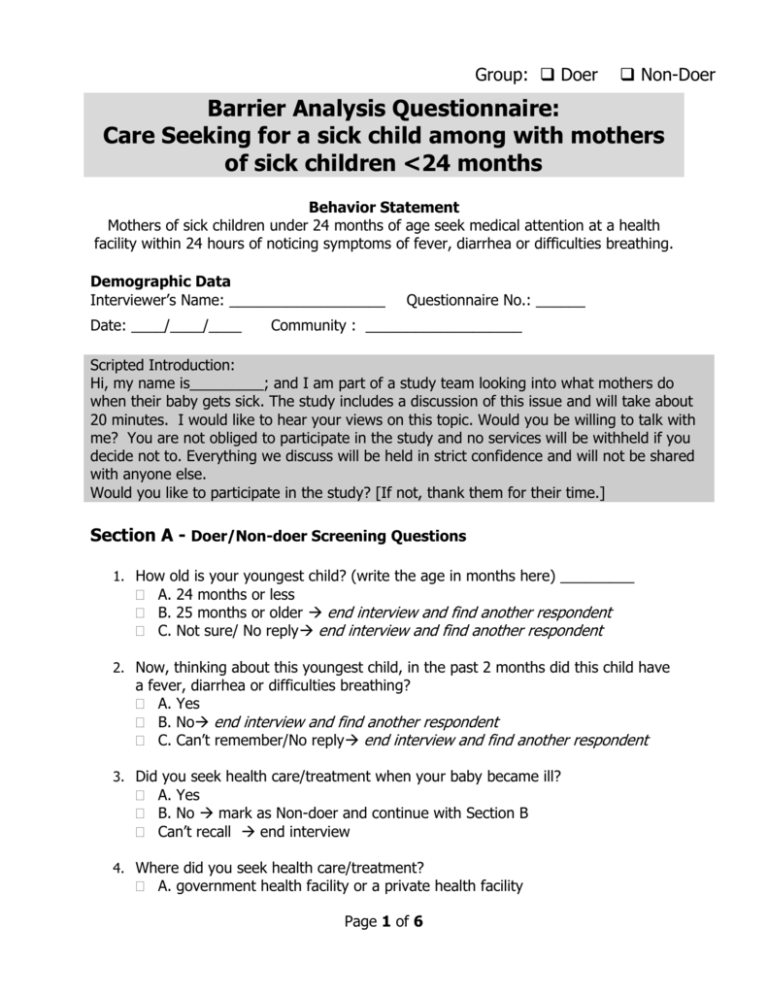
Group: Doer Non-Doer Barrier Analysis Questionnaire: Care Seeking for a sick child among with mothers of sick children <24 months Behavior Statement Mothers of sick children under 24 months of age seek medical attention at a health facility within 24 hours of noticing symptoms of fever, diarrhea or difficulties breathing. Demographic Data Interviewer’s Name: ___________________ Date: ____/____/____ Questionnaire No.: ______ Community : ___________________ Scripted Introduction: Hi, my name is_________; and I am part of a study team looking into what mothers do when their baby gets sick. The study includes a discussion of this issue and will take about 20 minutes. I would like to hear your views on this topic. Would you be willing to talk with me? You are not obliged to participate in the study and no services will be withheld if you decide not to. Everything we discuss will be held in strict confidence and will not be shared with anyone else. Would you like to participate in the study? [If not, thank them for their time.] Section A - Doer/Non-doer Screening Questions 1. How old is your youngest child? (write the age in months here) _________ A. 24 months or less B. 25 months or older end interview and find another respondent C. Not sure/ No reply end interview and find another respondent 2. Now, thinking about this youngest child, in the past 2 months did this child have a fever, diarrhea or difficulties breathing? A. Yes B. No end interview and find another respondent C. Can’t remember/No reply end interview and find another respondent 3. Did you seek health care/treatment when your baby became ill? A. Yes B. No mark as Non-doer and continue with Section B Can’t recall end interview 4. Where did you seek health care/treatment? A. government health facility or a private health facility Page 1 of 6 B. a traditional healer/ a spiritual healer/bought meds herself mark as Non- doer and continue with Section B Can’t recall/won’t say end interview and look for another respondent 5. From the time you noticed the symptoms, how long did it take for you to see a health care provider at a health facility? A. Within 48 hours (less than 2 days) B. Over 48 hours (more than 2 days) mark as Non-doer C. Don’t remember end interview and look for another respondent Doers/Non Doers Classification Table Doer Non Doer Don’t Interview (all of the following) (any of the following) (any of the following) Question 1=A Question 1 = B or C Question 2=A Question 2 = B or C Question 3=A Question 3 = B Question 3 = C Question 4= A Question 4 = B Question 4 = C Question 5 = A Question 5 = B Question 5 = C Group: Doer Non-doer Explanation: In the following questions I am going to be talking about a sick baby. When I say ‘sick baby’, I am talking about a child who has a fever, diarrhea or difficulty breathing. (Note: Consider having a picture showing infants with these symptoms as a reminder to the mother.” Section B – Research Questions (Perceived Self Efficacy / Skills) 1. Doer and Non-doer: With your present knowledge, money, and skills, do you think that you could seek treatment for your sick baby at a health facility within 24 hours of noticing the symptoms. a. Yes b. Possibly c. No d. Don’t Know (Perceived Self-efficacy) 2a. Doers: What makes it easy f or you to seek treatment for your sick baby at a health facility within 24 hours of noticing the symptoms?? 2b. Non-doers: What would make it easy for you to seek treatment for your sick baby at a health facility within 24 hours of noticing the symptoms? ? (Write all responses below. Probe with “What else?”) Page 2 of 6 (Perceived Self-efficacy) 3a. Doers: What makes it difficult for you to seek treatment for your sick baby at a health facility within 24 hours of noticing the symptoms? 3b. Non-doers: What would make it difficult for you to seek treatment for your sick baby at a health facility within 24 hours of noticing the symptoms?? (Write all responses below. Probe with “What else?”) (Perceived Positive Consequences) 4a. Doers: What are the advantages of seeking treatment for your sick baby at a health facility within 24 hours of noticing the symptoms? 4b. Non-doers: What would be the advantages of seeking treatment for your sick baby at a health facility within 24 hours of noticing the symptoms? (Write all responses below. Probe with “What else?”) (Perceived Negative Consequences) 5a. Doers: What are the disadvantages of seeking treatment for your sick baby at a health facility within 24 hours of noticing the symptoms? 5b. Non-doers: What would be the disadvantages of seeking treatment for your sick baby at a health facility within 24 hours of noticing the symptoms? (Write all responses below. Probe with “What else?”) (Perceived Social Norms ) 6a. Doers: Do most of the people you know approve of you seeking treatment for your sick baby at a health facility within 24 hours of noticing the symptoms? 6b. Non-doers: Would most of the people you know approve of your seeking treatment for your sick baby at a health facility within 24 hours of noticing the symptoms? a. Yes b. Possibly c. No d. Don’t Know / Won’t say Page 3 of 6 (Perceived Social Norms ) 7a. Doers: Who are the people that approve of you seeking treatment for your sick baby at a health facility within 24 hours of noticing the symptoms?? 7b. Non-doers: Who are the people that would approve of you seeking treatment for your sick baby at a health facility within 24 hours of noticing the symptoms? ? (Write all responses below. Probe with “Who else?”) (Perceived Social Norms ) 8a. Doers: Who are the people that disapprove of you seeking treatment for your sick baby at a health facility within 24 hours of noticing the symptoms?? 8b. Non-doers: Who are the people that would disapprove of you seeking treatment for your sick baby at a health facility within 24 hours of noticing the symptoms? (Write all responses below. Probe with “Who else?”) (Perceived Access) 9a. Doers: How difficult is it to get to the health center within 24 hours of noticing the symptoms? 9b. Non-doers: How difficult would it be to get to the health center within 24 hours of noticing the symptoms? a. Very difficult b. Somewhat difficult c. Not difficult at all. d. Don’t Know / Won’t say (Perceived Cues for Action / Reminders) 10a. Doers: How difficult is it to remember to seek treatment from a health center within 24 hr. of noticing symptoms? Very difficult, somewhat difficult, or not difficult at all? 10b. Non-doers: How difficult do you think it would be to seek treatment from a health center within 24 hr. of noticing symptoms? Very difficult, somewhat difficult, or not difficult at all? a. Very difficult b. Somewhat difficult c. Not difficult at all. d. Don’t Know / Won’t say (Perceived Susceptibility / Perceived Risk) 11. Doers & Non-doers: How likely is it that your child will get a fever in the next 3 months? Very likely, somewhat likely, or not likely at all Page 4 of 6 a. Very likely b. Somewhat likely c. Not likely at all. d. Don’t Know / Won’t say 12. Doers & Non-doers: How likely is it that your child will get diarrhea in the next 3 months? Very likely, somewhat likely, or not likely at all a. Very likely b. Somewhat likely c. Not likely at all. d. Don’t Know / Won’t say 13. Doers & Non-doers: How likely is it that your child will have difficulty breathing in the next 3 months? Very likely, somewhat likely, or not likely at all a. Very likely b. Somewhat likely c. Not likely at all. d. Don’t Know / Won’t say (Perceived Severity) 14. Doers and Non-doers: How serious would it be if your child got a fever? Very serious, somewhat serious, or not serious at all? a. Very serious b. Somewhat serious c. Not serious at all d. Don’t Know / Won’t say 15. Doers and Non-doers: How serious would it be if your child got diarrhea? Very serious, somewhat serious, or not serious at all? a. Very serious b. Somewhat serious c. Not serious at all d. Don’t Know / Won’t say 16. Doers and Non-doers: How serious would it be if your child had difficulties breathing? very serious, somewhat serious, or not serious at all? a. Very serious b. Somewhat serious c. Not serious at all d. Don’t Know / Won’t say Page 5 of 6 (Action Efficacy) 17. Doers and Non-doers How likely is it that your sick child would recover quickly if you sought treatment from a health center within 24 hours of noticing symptoms? Very likely, somewhat likely, or not likely at all a. Very likely b. Somewhat likely c. Not likely at all. d. Don’t Know / Won’t say (Perception of Divine Will) 18. Doers: Do you think that God makes babies sick? a. Yes b. No c. Don’t Know / Won’t say (Policy) 19. Doers: Are there any community laws or rules in place that make it easier for you to seek treatment for your sick baby from a health center within 24 hours? 19b. Non-doers: Are there any community laws or rules in place that you know of that would make it easier for you to seek treatment for your sick baby from a health center within 24 hours? a. Yes b. No c. Don’t Know / Won’t say (Culture) 20. Doers and Non-doers: Are there any cultural rules or taboos that you know of against seeking treatment for a sick baby from a health center within 24 hours? a. Yes b. No c. Don’t Know / Won’t say Now I am going to ask you a question totally unrelated to seeking care for a sick child. (Universal Motivators) 21. Doers and Non-doers: What is the one thing that you desire most in life? THANK THE RESPONDENT FOR HER TIME! Page 6 of 6
